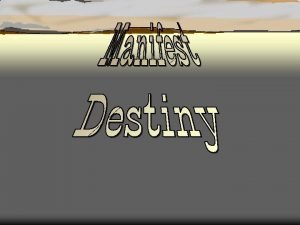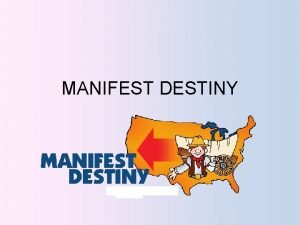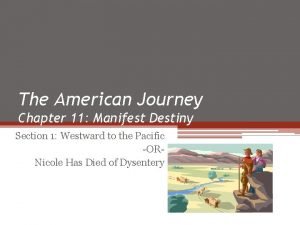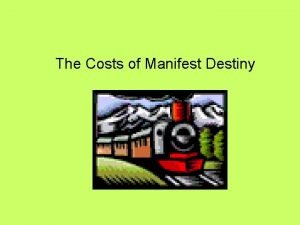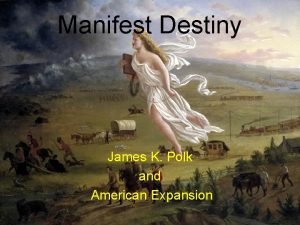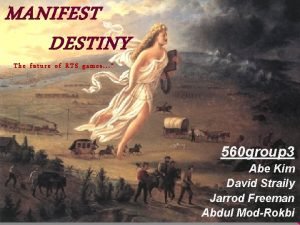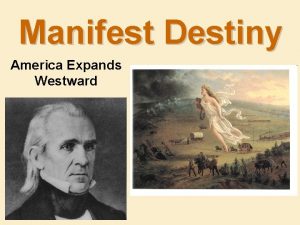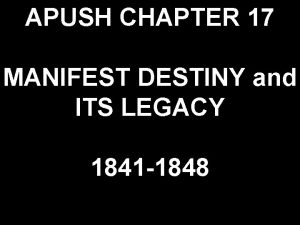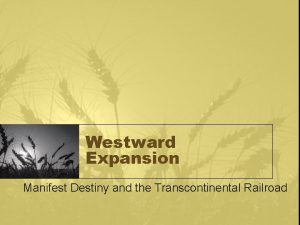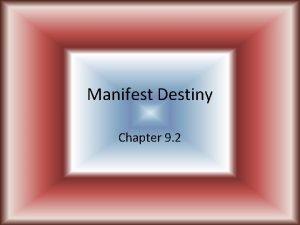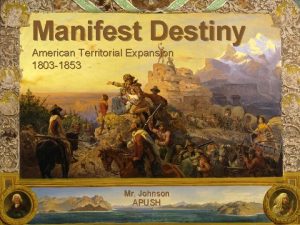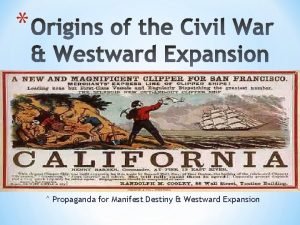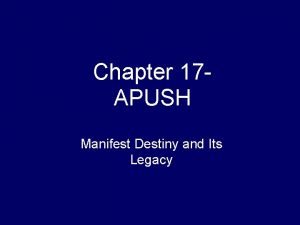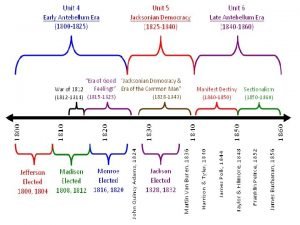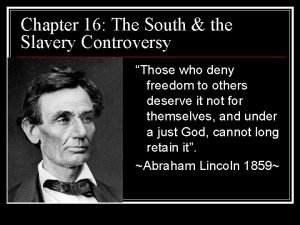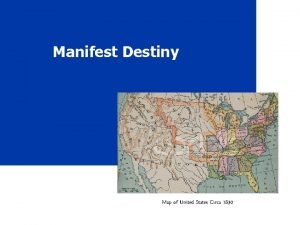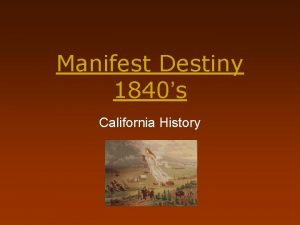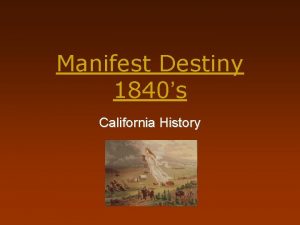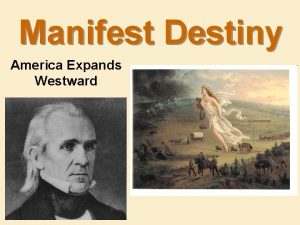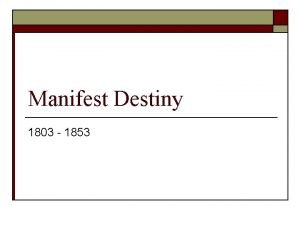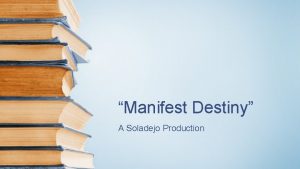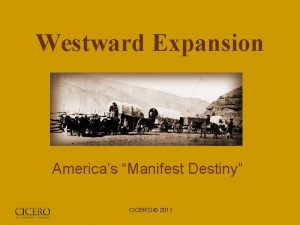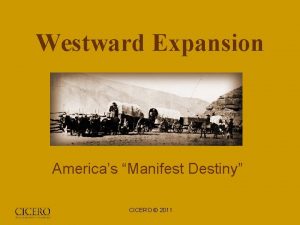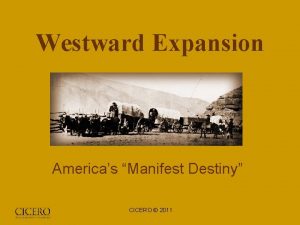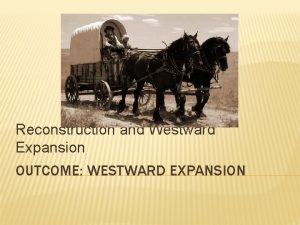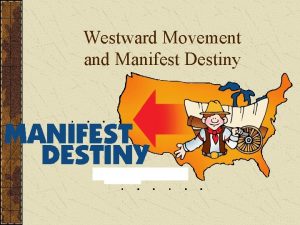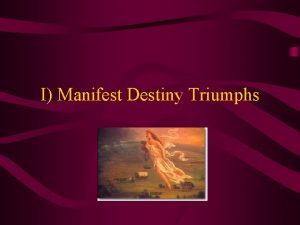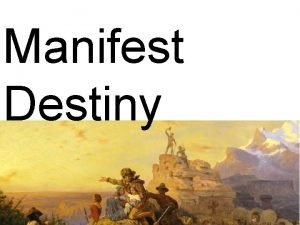WESTWARD EXPANSION MANIFEST DESTINY 1840s expansion of the






















- Slides: 22

WESTWARD EXPANSION

MANIFEST DESTINY • 1840’s expansion of the west exploded. Felt moving westward was predestined by God • Reasons – abundance of land, new markets, new opportunities, spread Christianity • "(It is). . our manifest destiny to over spread and to possess the whole of the continent which Providence has given us for the development of the great experiment of liberty" In 1845 these words were written by John O'Sullivan, a democrat leader and editor newspaper


TEXAS INDEPENDENCE • 1835 - Texans claimed independence from Mexico - war • -Remember the ALAMO(1836) The Mexican army killed all 187 US defenders • Then Sam Houston and his rebels attacked a Mexican army and cried “Remember the Alamo” which ended the war and Texas gained independence


WAR WITH MEXICO • 1845 –Texas entered the Union • Pres. Polk –wanted all the land to the Rio Grande – • Tried peace talks – Mexico refused • Called for War • Treaty of Guadalupe Hidalgo -Mexico agreed to border at the Rio Grande plus US gained NM and CA The US paid Mexico 15 million for the land.

CA gold rush • 1848 - Gold found • Forty -niners • CA population rose from 400 (1848) to 44, 000 (1850) to 100, 000(1859) • Revolutionized California’s economy

Compromise of 1850 • California would become a free state – New Mexico gets Texas Territory – D. C. gets rid of slave state • South gets – New Mexico and Utah get popular soverienty (opportunity to choose whether they will be a free or slave state) – Texas will receive $10, 000 for the land they lose to Mexico – Tougher Fugitive Slave Laws (Runaway slaves)

Kansas – Nebraska Act of 1854 (Stephen Douglas) • Kansas would be a slave & Nebraska would be a free state • Totally wrecked the Missouri compromise because Kansas was above the 36 30 line. • Technically – it would be decided by popular soveirenty (the right to choose)

Bleeding Kansas • Slavery in Kansas • People were angry because Kansas was above the 36 30 line. • 1856 U. S. Senate – Mass senator Charles Sumner – Made an ugly speech about the south – A South Carolina Senator – Preston Brooks gets up and strikes sumner with a cane.

Sumner vs. Brooks Cont. • Brooks resigns his seat, but was rejected by his people as they voted him back in. • Sumner had to leave for treatment in Europe. Was badly injured from the beating. • The Kansas problem spilled over into the Senate.

Dred Scott Decision • Dred Scot was a slave who went to the federal court to argue that if a slave is taken into a northern state then that slave should be free. • March 6, 1857 – – Ruled that slaves can’t go to federal court Slaves are property and can be taken anywhere Chief Justice Roger Taney Said Congress can’t ban Slavery.

REFORMING AMERICA SOCIETY • Second Great Awakening • 1790’s to 1830’s a Christian movement that focus on revivals

SLAVERY AND ABOLITION • ABOLITION- the movement to free African Americans from slavery

William Lloyd Garrison • White abolitionist called for immediate freedom of slaves • In the very first issue of his antislavery newspaper, the Liberator, William Lloyd Garrison stated, "I do not wish to think, or speak, or write, with moderation. . I am in earnest -- I will not equivocate -- I will not excuse - I will not retreat a single inch -- AND I WILL BE HEARD

FREDERICK DOUGLASS The most prominent black abolitionist • Escaped from bondage in 1831 at age 21 • Gifted orator, editor, writer • Critic of slavery through His newspaper, The North Star • Looked at politics to change slavery

Turner’s REBELLION • Slaves rebelled against their conditions led by Nat Turner, a VA slave in August 1831 • Turner and 50 others attacked 4 plantations and killed around 60 • Eventually Turner and followers were captured and killed • Importance- scared slaveholders and encouraged the abolitionist movement

Women’s REFORM • Women played important roles in reform: • Abolitionists • Temperance (effort to prohibit alcohol) • Education • Health Care

Women’s rights emerge • Seneca Falls – women’s conference calling for the right to vote • Sojourner Truth – abolitionist, sought equal rights for women and African Americans

UNDERGROUND RAILROAD • Secret network of people who would help slaves to freedom • Harriet Tubman helped over 300 slaves to freedom


READING NOTES • COMPLETE THE READING NOTES AND MAP USING THE COPIED TEXT
 Gadsden purchase jimmy fallon
Gadsden purchase jimmy fallon Manifest destiny 1840s
Manifest destiny 1840s Manifest destiny newspaper
Manifest destiny newspaper Obvious fate means
Obvious fate means Manifest
Manifest Costs of manifest destiny
Costs of manifest destiny Manifest destiny effect
Manifest destiny effect Poem on sports
Poem on sports Which president completed manifest destiny
Which president completed manifest destiny Monroe doctrine and manifest destiny
Monroe doctrine and manifest destiny Rts manifest
Rts manifest Define manifest destiny in your own words
Define manifest destiny in your own words Apush chapter 17
Apush chapter 17 Manifest destiny railroads
Manifest destiny railroads America is destined for better deeds
America is destined for better deeds Chapter 9 manifest destiny answer key
Chapter 9 manifest destiny answer key Manifest destiny
Manifest destiny Westward expansion propaganda
Westward expansion propaganda Whats the definition of manifest destiny
Whats the definition of manifest destiny His accidency apush
His accidency apush American progress by john gast 1872
American progress by john gast 1872 Manifest destiny
Manifest destiny Us map 1830
Us map 1830


